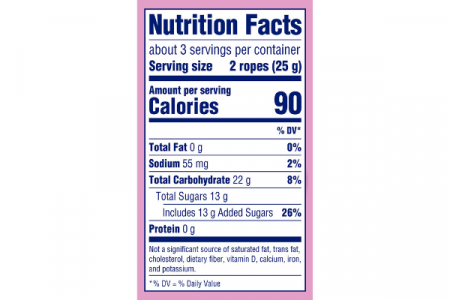So, you bought some packets of delicious sweet tarts for your little girl. But when you were about to hand them over to her after she returned from school, they were gone!
You can’t blame your four-legged canine companion for vanishing away some sweet tarts, can you?
Are you worried about your dog’s health? Are you concerned whether dogs can eat sweet tarts or not?
In this article, we will explain the risks of consuming sweet tarts in dogs and some healthier alternatives.
Are Sweet Tarts Safe For Your Dog’s Consumption?

Not at all. By looking at a typical wrapping of sweet tarts, you will realize that they are not safe for dogs. These sweet tarts contain 3 grams of artificial sugar content per 15 grams of the serving.
Sweet tarts have an unhealthy bunch of preservatives, chemicals, false coloring agents, and fillers. All of this makes sweet tarts toxic for a dog’s consumption.
What Are The Nutritional Facts Related To Sweet Tarts?

The following chart depicts the nutritional facts of one serving of sweet tarts (approximately 1.6 grams):
| Serving Size | 1 piece (1.6g) |
| Calories Per Serving | 6.3 |
| % Daily Values | |
| Total Fat 0g | 0% |
| Saturated Fat 0g | 0% |
| Polyunsaturated Fat 0g | |
| Monounsaturated Fat 0g | |
| Cholesterol 0mg | 0% |
| Sodium 0mg | 0% |
| Potassium 0mg | 0% |
| Total Carbohydrate 1.6g | 1% |
| Dietary Fiber 0g | 0% |
| Sugars 1.6g | |
| Protein 0g | |
| Vitamin A | 0% |
| Vitamin C | 0% |
| Calcium | 0% |
| Iron | 0% |
Source: https://www.nutritionix.com/food/sweet-tarts
What Happens When Your Dog Eats Sweet Tarts?
Do not worry if your dog has eaten one or two pieces of sweet treats; it won’t cause him much trouble. They might vomit a little bit and nothing more than that. If your dog only vomits once, there is no need to go to the vet.
However, if your furry pooch eats up an entire bag of sweet tarts, you must rush to the vet immediately. Such high consumption of sugary foods can easily lead to diabetes in dogs. There might be a critical chance of him surviving if left untreated.
Moreover, you must closely watch your dog if you are not able to figure out the amount he has eaten. You should go to the emergency clinic right away if your furry friend constantly feels nauseous and vomiting uncontrollably.
In addition, irrespective of the number of sweet tarts consumed, you must give plenty of water to your dog. You can take him out for a short walk and treat him to some fresh air.
Tip: You can go through some of these insights shared by dog owners whose pups ate sweet tarts.
How Does Xylitol In Sweet Tarts Affect Dogs?
Xylitol is basically an artificial chemical sweetener used in gums, chewable vitamins, mints, and sweet tarts.
It is an undeniable fact that xylitol is highly dangerous for dogs. The following symptoms of xylitol toxicity are usually be observed 30 minutes after ingesting sweet tarts:
-
Rushed insulin release
Low blood sugar
General weakness
Seizures
Unsteadiness
Shakiness
Liver damage
However, you might not notice the signs of xylitol poisoning in your dog even after two or three days of ingesting sweet tarts.
The following symptoms of liver injury are often observed in dogs due to consumption of xylitol-rich sweet tarts:
-
Excessive Vomiting
Diarrhea
Decreased (or loss of) appetite
Lethargy
Jaundice
Death in rare cases
Thus, sweet tarts are as dangerous for dogs as delicious as they are for humans.
What Are The Alternatives To Sweet Tarts For Dogs?

Refraining from feeding sweet tarts to your dog does not mean that sweet treats are banned for him. However, you must keep in mind that such sugary foods should never go beyond 10% of your dog’s daily food intake.
Following are some healthier alternatives to sweet tarts for your dog:
-
Carrots: They are very rich in fiber and Vitamin A
Fish: It has excellent anti-inflammatory properties and is rich in Omega-3 fatty acids
Plain yogurt: It is an excellent source of rich protein and good bacteria
Pumpkin: It is considered a storehouse of essential minerals and vitamins
Do not worry; we will not recommend only ‘boring’ foodstuff for your furry friend. Following is the list of some interestingly sweet food items which are much better than the artificial sweet tarts:
-
Apples (dried or fresh)
Organic Peanut Butter
Blackberries
Raspberries
Sweet Potatoes
Blueberries
Bananas (dried or fresh)
Cherries
Strawberries
Note: Most of your dog’s daily nutrition intake should be from a healthy, organic, highly nutritious, and well-balanced kibble.
FAQs
Q. Can dogs eat sweet tart ropes?
No, dogs should not eat sweet tart ropes. You should not worry if they accidentally eat 1-2 pieces of it. However, eating up half a bag of sweet tart ropes can have disastrous consequences for your dog.
The ingredients present in sweet tart ropes are very harmful for a dog’s consumption. You can read this Reddit thread wherein people discussed instances of their dogs eating sweet tart ropes.
Q. Can dogs eat sweet tart candies?
No, dogs should not consume sweet tart candies. Again, you need not worry if your furry pooch ends up eating 1-2 sweet tart candies by mistake. However, too much consumption of sweet tart candies can give your dog seizures, diarrhea, and diabetes.
You can go through this chat on a public forum wherein dog owners share the moments when their dogs ate sweet tart candies.
Conclusion
Medical research has time and again proved why sugary foods are dangerous for dogs. Though humans and dogs might enjoy sweet tarts alike, it is not good for dogs, let alone humans.
You can feel free to consult your vet if you want to have further confirmation about whether your dog should gulp down some sweet tarts or not. We are sure the vet’s advice would be no different than ours.
Conclusively, sweet tarts are not meant for dogs; thus dogs should not eat them. We truly hope that by reading this article, you must have figured out whether you should feed sweet tarts to your dogs or not.
Do you wish to share an instance when your canine companion ate sweet tarts for the first time in his life? Did the information expressed in this article resolve your queries? Feel free to share your stories, opinions, and suggestions in the comments below!

Dr. Aram Baker has been with Santa Clarita Animal Hospital since 1995 and his special interests include behaviour medicine and dermatology. He graduated from the Cleveland Humanities Magnet Program in Reseda, CA and attended California State University at Northridge where he received a Bachelor’s degree in biology. He went on to pursue his Doctorate in Veterinary Medicine at the University of California at Davis. He also spent time in the zoological medicine department at U.C. Davis during his Junior and Senior years. He is dedicated to caring for all pets big or small, young or old with compassion, patience, kindness, and love.
